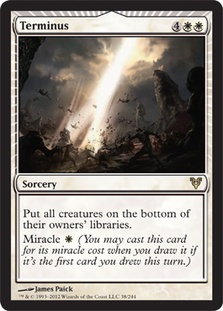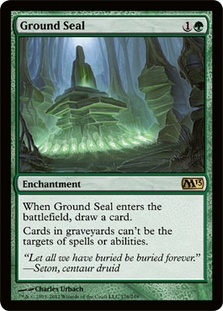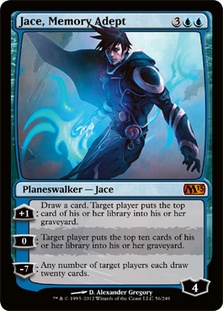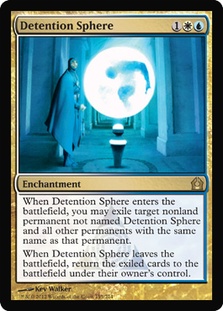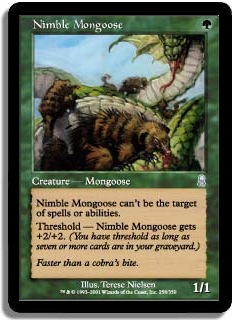Confidence in one’s ability to make quality decisions is critical for tournament success because without belief that one’s plays are proficient, a player is merely guessing, crossing their fingers, and hoping for everything to work out all right.
A match of Magic is unfathomably complex, with each participant making more choices than they can ever fully comprehend. All players rely on their instinct and intuition when determining and executing the countless lines of play undertaken during the course of a tournament, and it is confidence in the correctness of one’s inferences that allows for players to compete at a high level.
When one is winning it is easy to have confidence about their play, as there is no evidence to suggest otherwise. The concept of playing well is so closely linked with winning that to scrutinize one’s own play in the midst of a hot streak seems at best impractical and at worst detrimental. Why would a player look to change the way they play when already getting the desired result (i.e., winning)?
In the big picture, honest criticism of one’s own play and willingness to learn from mistakes are necessary in order to improve over time, but in the thick of a tournament, confidence and self-trust are everything. To allow doubt to creep in and begin focusing upon mistakes, misfortunes, and second-guessing oneself is to invite failure.
Can’t Win ‘Em All or Can’t Win At All?
It has been well over a month since I did well in a tournament, and the misery of an extended losing streak is comparable only to Detroit Lions fandom.
Grand Prix San Diego (3-3)
Grand Prix Pittsburgh (3-3)
Super Sunday Qualifier (4-4)
SCG Invitational: Atlanta (2-6)
SCG Standard Open: Atlanta (6-4)
My total record in matches actually played (not including byes) is 18-20 over the course of the past four weeks, which does not live up to the expectation I have for myself.
I am currently watching Star Trek: The Next Generation for the first time, and one episode I recently watched resonated strongly with me. In the episode "Peak Performance," Commander Data loses a game of Strategema to Zakdorn Master Strategist Sirma Kolrami. The experience greatly shakes his confidence and causes him to question his judgment.
The android confides to his friend and superior officer, Captain Picard, that after reviewing his play he cannot identify having made any mistakes and concludes that as a result he is no longer fit to make decisions. Picard restores the android officer’s confidence with a line that I, as a Magic player, found particularly poignant: "It is possible to make no mistakes and still lose."
I have already touched on the idea that players tend to correlate victories to playing well and defeats to playing poorly, but in reality it isn’t always the case. At the SCG Standard Open in Atlanta, I played a game where I won the die roll and curved out with Farseek, Supreme Verdict, Thragtusk, Thragtusk, and finally Sphinx’s Revelation against a poor R/G Aggro player.
Did I win because I played better than my opponent? Did he lose because he played poorly?
The outcome of the game had little to do with our lines of play and more to do with who won the die roll, what the matchup was, and what cards we drew. It is likely that I could have played slightly suboptimally and still won and that he played without making a single mistake and still lost. "It is possible to make no mistakes and still lose." Touche, Jean-Luc.
At Grand Prix San Diego, I lost to Owen Turtenwald, Ben Stark, and my worst matchup. I consider Owen and Ben to both be among the best players in the world and felt our matches were very closely contested.
At Grand Prix Pittsburgh, a friend asked me how my deck was during the byes, and I remember saying that it was below average with no removal and bad mana. I thought my deck could realistically get me between three and four wins depending on whether or not I drew all my colors. I lost a round to Firemane Avenger and two to mulliganing and being mana screwed.
In the Super Sunday Sealed, I opened an awful pool and for lack of any other entertaining thing to do endured the misery of grinding Planeswalker Points for eight rounds with my rotten Sealed deck.
To summarize, I lost close matches to two of the best players in the world, one to my worst Constructed matchup, one to Firemane Avenger in Sealed, two to mana screw with a deck that lacked fixing, and four with a deck that I seriously (and correctly) contemplated 1-0 dropping from the event. In retrospect, those are pretty reasonable losses to have taken.
If only losing felt reasonable…
SCG Invitational Tournament Report: 245th Place
Magic, as is the case with any competitive activity involving chance, can become frustrating when it feels like things are not going your way. The fact of the matter is that if everything went everybody’s way all the time, then everybody would win, and that simply is not possible.
I had an absolutely horrific SCG Invitational in Atlanta and finished with a record of 1-6 before barely defeating the bye in the last round. The Standard Open didn’t go much better, as I lost the last two rounds to miss finishing in the money with a 6-4 record.
In Legacy, I played U/W/R Miracles, a deck with which I have a great deal of experience, and I lost four very close matches with it. In Standard, I played a modified version of Kyle Boggemes‘ Bant Control deck that I’d been playing and tuning for the past week.
Miracles was a terrible choice for the Invitational, as I didn’t play against a single favorable matchup, and in hindsight there were some problems with my Standard Bant deck that I didn’t realize beforehand.
Creatures (8)
Planeswalkers (1)
Lands (25)
Spells (26)
- 1 Ground Seal
- 2 Dissipate
- 1 Island
- 1 Syncopate
- 4 Farseek
- 2 Think Twice
- 3 Terminus
- 4 Azorius Charm
- 4 Supreme Verdict
- 4 Sphinx's Revelation
Sideboard

The biggest difference between this deck and other Bant decks is that it plays Terminus, Ground Seal, and Jace in the maindeck instead of creatures like Centaur Healer, Loxodon Faithmender, and Angel of Serenity.
"100% game win percentage against G/B/W Reanimator."
The upside of this deck is that it is very good against the R/G aggressive decks and Reanimator decks, which were the two decks I tested against the most.
One maindeck Ground Seal in any deck that can dig with Sphinx’s Revelation adds a ton of percentage against Reanimator. It is a fine draw against decks with Snapcaster Mage, and at least cantrips against decks where it is dead. The upside is that it drastically improves the Reanimator matchup, especially because many Reanimator decks simply cannot get rid of it game 1.
Here is what I played against with the deck and how I fared:
Grixis Control: 0-1
U/W/R Flash: 1-1
Naya Blitz: 3-0
G/B/W Reanimator: 3-0
Naya: 0-1
Jund: 0-2
B/R Zombies: 0-1
My deck with seven Wraths was awesome at beating creature decks but really struggled against opposing planeswalkers, which I didn’t play against in local tournaments or testing. I lost to Domri Rade; Garruk, Primal Hunter; Liliana of the Veil; and Jace, Memory Adept. In fact, I think I may only have lost one or two games all weekend where my opponent didn’t cast a planeswalker.
"Garruk me once, shame on you. Garruk me twice, shame on me."
My Standard deck was realistically a couple Detention Spheres away from being a deck capable of finishing in the money, which while frustrating is something I can accept. The one bright side of this tournament is that while I didn’t do as well as I would have liked, I did stick with my vow to playtest Constructed every week and did very well (6-0) against the decks that I tested heavily against (an encouraging sign that testing worked and that more extensive testing against a broader range of decks could help even more).
Four Tips to Extend a Losing Streak
After reflecting upon my weekend and my preparation, I realize that I doomed myself right from the start. I am not saying I subconsciously wanted to lose, but rather that my actions and thought processes were largely unproductive, illogical, and caused me more harm than good.
Here are four extremely easy things anyone can do to ensure that their losing streak remains intact.
Surefire Way to Fail #1: Overreact and Change Things at the Last Minute
I was 100% committed to playing RUG Delver at the Invitational and was confident in my ability to play the deck well. On Wednesday night before the tournament, I played a bunch of games against a friend’s Esper Deathblade deck that was well tuned to beat RUG and lost a bunch of games.
Instead of being reasonable and logical and adding a few Izzet Charms to my deck, I instead abandoned the deck and threw together the Miracles deck. If I had been reasonable, I would have just added a couple of Izzet Charms to my RUG deck, which is what I suggested my friend Max do for the Invitational. He went 6-2 in his first ever Legacy tournament.
I, on the other hand, went 0-4. Also, against my better judgment, I didn’t play my Miracles list with Stoneforge Mystics and instead played the version that won a SCG Open a month ago.
I would have done much, much better had I played the version I built before rather than switching to the one that won more recently.
Surefire Way to Fail #2: Start Doubting Yourself and Do the Opposite of What You Think Is Right
I thought I should play RUG Delver—I even had the whole deck together—but I talked myself out of playing it even though I knew deep down it was a good deck.
I thought if I played Miracles that my Stoneforge version was better than the Helm of Awakening one I found online, but I talked myself into playing a deck I ended up not liking at all.
Traveling around from tournament to tournament losing sucks and gets really discouraging. At the end of the day, instead of making my own call and playing what I thought was good, I did the opposite because I didn’t trust my own judgment.
Confidence and sticking to one’s guns even when things get a little bit tough can be difficult, but it is necessary. A while back, I remember reading about how Brian Kibler was on a ridiculous losing streak where he had lost a bunch of matches in a row spanning a couple of GPs. Kibler didn’t abandon his game and start playing mono-blue—he built a Knight of the Reliquary deck and made Top 8 of a Grand Prix.
Surefire Way to Fail #3: Lose Confidence and Get Back into Bed with Your Ex
Metaphorically speaking, of course. Actually, this is pretty much the definition of a surefire way to fail.
Back in the day, I always used to play the slowest, bluest control deck that was viable in a format. Since the days of my youth, I have learned that passive decks are deathtraps even if they are sometimes also inherently powerful.
Now that I’m older, I realize that I prefer decks that have the ability to be proactive—for instance, decks that don’t need six lands in play before they can actually be offensive. If I don’t get mana screwed, if I have a removal spell for you first guy, if I have a Wrath, if I have a draw spell, and if I plays seven lands, then I am going to finally play a threat and start attacking you…
Playing midrange and aggressive decks hadn’t worked well for me lately, so I gave up on them and went back to my old ways. Old habits die hard.
Surefire Way to Fail #4: Go On Tilt and Never Stop Tilting
The goal should be to never go on tilt, but that is probably an unreasonable goal. Everyone who cares about winning goes on tilt sometimes—and always to their own detriment.
In game 1, round 1 of the Legacy portion of the invitational, I lost from a position where my RUG Delver opponent had no hand and no creatures in play and I was at seven life and had three basics, Rest in Peace in play, and a hand of Jace, Jace, Force of Will, Swords to Plowshares, and Helm of Awakening. I Forced his first Mongoose and got attacked five times by his 1/1 before I drew a flooded Strand I couldn’t activate.
What a frustrating game to lose. What if instead of drawing every single card in my deck that didn’t help me, I just drew a land and won the game on the spot.
"Is there anything more tilting than losing to 1/1 hexproof beatdown with Swords in hand? I doubt it."
I don’t know what it was specifically—getting attacked to death by a lone 1/1 hexproof creature or bricking six draws in a row on land—but I was so badly tilted after my first match that it pretty much lasted all weekend and I was never able to snap out of it.
When I go on tilt, I feel like everything that can possibly go wrong does.
Of course, my opponent won the die roll, why wouldn’t he?
He would get to keep his hand of seven, while I, of course, have to mulligan.
Oh, he has Champion of the Parish on the first turn, of course.
Obviously, I have a hand that would win on the play but loses on the draw.
If I were not on tilt, those situations seem pretty reasonable.
My opponent was 50% to win the die roll and did.
One player kept seven and one had to mulligan—pretty standard.
He didn’t mulligan and had a one-drop. Shocking. Perhaps he kept because he had his best card.
There are lots of hands that beat Naya Blitz on the play but lose on the draw. Just like against Workshop in Vintage, some decks are just heavily favored against the world on the play.
When You Lose, Remember…
You can’t always win, and just because you lose doesn’t mean you played badly.
Even if you lose, it is important to remain confident in your ability to make good plays and decisions. Lose that and you are truly lost.
Testing is great, and the better the testing is, the better off you’ll be.
It is impossible to tilt and play well.
When you feel like everything is going to go wrong, it always does.
It is possible to make no mistakes and still lose.
Thanks for reading.
Cheers,
Brian DeMars

